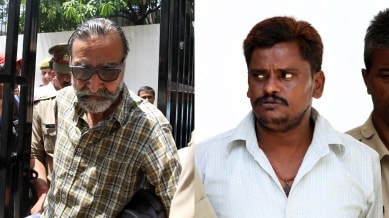Stay updated with the latest - Click here to follow us on Instagram
‘There is nothing’: Supreme Court questions Nithari evidence, reserves order on Koli plea challenging conviction
The Nithari serial killings came to light with the discovery of the skeletal remains of eight children from a drain behind Moninder Singh Pandher's house in Noida in December 2006

The Supreme Court on Tuesday reserved its judgment on a curative petition filed by Surinder Koli, challenging his conviction in the murder and rape case of a teenage girl in connection with the Nithari serial killings.
The Nithari killings came to light with the discovery of skeletal remains of eight children from a drain behind businessman Moninder Singh Pandher’s house at Nithari in Noida on December 29, 2006.
The CJI told Raja Thakare, Special Prosecutor for the CBI, “…an anomalous situation would arise, that on the same set of facts, in other matters he is acquitted, that acquittal is confirmed by this court, and on similar facts, conviction is (upheld in one case). It is not travesty of (justice)?”
The senior counsel said, “There are certain peculiar facts of this case. The first – the fundamental of a criminal trial is that the evidence in a particular trial will alone determine the outcome of that case to the exclusion of the evidence in another case. The curative petition is based on the ground of passing of subsequent orders in different matters in a different view.”
Justice Nath, however, disagreed. “We are all aware that the evidence is common in all cases, they have been led separately and independently… But what is the evidence? You have two things. One is the confessional statement under Section 164 CrPC and the other is the recovery of a knife, which is a kitchen knife,” he said.The CJI added that it was recovered from a gully behind his house. “There is nothing,” Justice Nath said.
The CJI told Thakare, “As a solicitor, we expect you to be an officer of the court.”
In a lighter vein, he added, “I have very good impression of you from Bombay, let Delhi pollution not pollute you.”
Justice Nath told the probe agency, “This is… a matter where there is no option but to concede.” The CJI added, “This is a matter which requires to be allowed in a minute.” To this, Justice Nath said, “Yes.”The senior counsel said, “On the contrary, I would say this is a matter which really requires consideration from other angles.”
He added, “In this case, the evidence which was led was examined at three levels (trial court, high court and Supreme Court).”
Justice Nath pointed to the recovery of the murder weapon, the kitchen knife and asked if it is possible to cut human bones with it. Thakare pointed out that the facts were not disturbed by the court even when the review petition was dismissed.
In July, a Supreme Court bench of CJI Gavai and Justice S C Sharma and Justice K Vinod Chandran had dismissed all appeals filed by the CBI and the families of the victims of the Nithari serial killings, challenging the acquittal of main accused Koli and his former employer Pandher by the Allahabad High Court in 2023.Koli, however, continued to remain in prison, as he was convicted in one of the cases and was sentenced to life imprisonment by the high court.
Skeletal remains of eight children were discovered from a drain behind Pandher’s house at Nithari in Noida in December 2006. Further digging of drains around Pandher’s house led to the recovery of more skeletal remains. Most of these remains were those of poor children and young women who had gone missing from the area.Pandher and Koli, his domestic help, were arrested the same month.
They were accused of abducting and raping children and women, committing acts of cannibalism, and disposing of their bodies in a drain. Koli had allegedly killed the girls and chopped their bodies before throwing them in the backyard.
On October 16, 2023, the Allahabad HC acquitted Koli in 12 cases and Pandher in two. Both had earlier been awarded the death penalty in these cases relating to rape, murder, and the destruction of evidence, among others, by a CBI court in Ghaziabad.
Pandher was accused in six cases – he was earlier acquitted by the trial court in three cases and in one by the HC. He was also convicted under the Immoral Trafficking (Prevention) Act, 1956, and in another case arising out of the Nithari killings against which no appeal was filed. However, the High Court had said that he had already completed the sentence prescribed under the said conviction. Pandher was in jail for around13 years after he was first arrested in December 2006, along with Koli.
On February 13, 2009, Koli and Pandher were sentenced to death by a special CBI court for the rape and murder of a 14-year-old child. On appeal, the HC confirmed Koli’s death sentence but acquitted Pandher. Following this, Koli had moved SC with a plea, which was dismissed in 2011.In January 2015, the High Court commuted Koli’s sentence to life imprisonment in this case, citing “inordinate delay in the disposal of the mercy petition”.
The police had lodged 19 FIRs against the two in connection with alleged crimes against 19 girls.